Lestes elatus
Lestes elatus[2][1] is a species of damselfly in the family Lestidae, the spreadwings. It is known commonly as the emerald spreadwing.[3][4] It is native to India, Thailand and Sri Lanka.[1][1][5]
| Lestes elatus | |
|---|---|
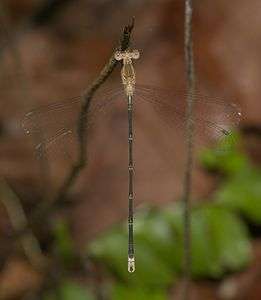 | |
| Male | |
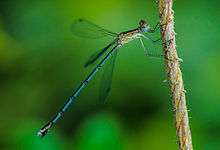 | |
| Female | |
| Scientific classification | |
| Kingdom: | |
| Phylum: | |
| Class: | |
| Order: | |
| Suborder: | |
| Family: | |
| Genus: | |
| Species: | L. elatus |
| Binomial name | |
| Lestes elatus Hagen in Selys, 1862 | |
Description and habitat
It is a medium sized damselfly with greenish blue eyes. Thorax is brown on dorsum, changing to yellowish-brown on the sides. The dorsum of thorax is marked with a pair of narrow ante-humeral metallic green stripes expanded outwardly at the abdominal end like a hockey stick. There are three tiny black spots on the lateral sides. The brown color of the thorax will change to bluish-white due to pruinescence in adults. Its abdomen is pale yellowish brown at the sides in the young, marked broadly on dorsum with metallic green, up to segment 8. The basal half of segment 9 is black and the apical half is yellowish brown. Segment 10 is yellowish brown. The yellowish-brown color of the abdomen will change to bluish-white due to pruinescence in the adults. Anal appendages are creamy yellow, broadly tipped with black in the young; entirely black in the adults. It can be easily distinguished from other species of this genus by its unique metallic thoracic stripes.[6]
Female is similar to the male and with less pruinescence.[6]
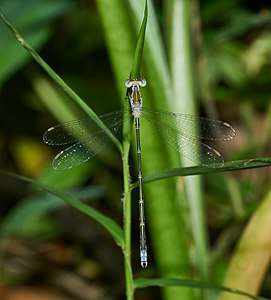 Adult male with pruinescence
Adult male with pruinescence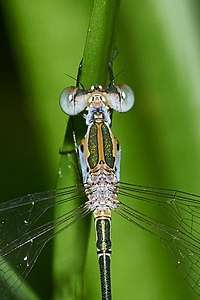 Hockey stick mark on the thorax
Hockey stick mark on the thorax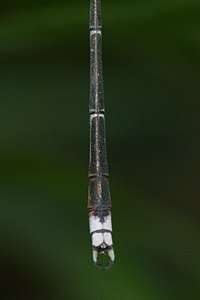 Anal appendages of the male
Anal appendages of the male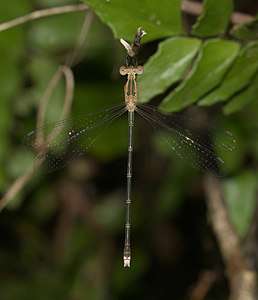 Female
Female
It breeds in ponds, marshes and paddy fields in the plains.[6][7][8][3][4]
See also
- List of odonates of India
- List of odonates of Sri Lanka
- List of odonata of Kerala
References
- "Lestes elatus". IUCN Red List of Threatened Species. 2011: e.T190840A8835656. 2011.
- Martin Schorr; Dennis Paulson. "World Odonata List". University of Puget Sound. Retrieved 12 Oct 2018.
- "Lestes elatus Hagen in Selys, 1862". India Biodiversity Portal. Retrieved 2017-03-08.
- "Lestes elatus Hagen in Selys, 1862". Odonata of India, v. 1.00. Indian Foundation for Butterflies. Retrieved 2017-03-08.
- K.A., Subramanian; K.G., Emiliyamma; R., Babu; C., Radhakrishnan; S.S., Talmale (2018). Atlas of Odonata (Insecta) of the Western Ghats, India. Zoological Survey of India. pp. 36–37. ISBN 9788181714954.
- C FC Lt. Fraser (1933). The Fauna of British India, including Ceylon and Burma, Odonata Vol. I. Red Lion Court, Fleet Street, London: Taylor and Francis. pp. 37-40.
- C FC Lt. Fraser (1924). A Survey of the Odonate (Dragonfly) Fauna of Western India with Special Remarks on the Genera Macromia and Idionyx and Descriptions of Thirty New Species (PDF). Zoological Survey of India. Volumes (Records). p. 484.
- Subramanian, K. A. (2005). Dragonflies and Damselflies of Peninsular India - A Field Guide.
External links
![]()
![]()
